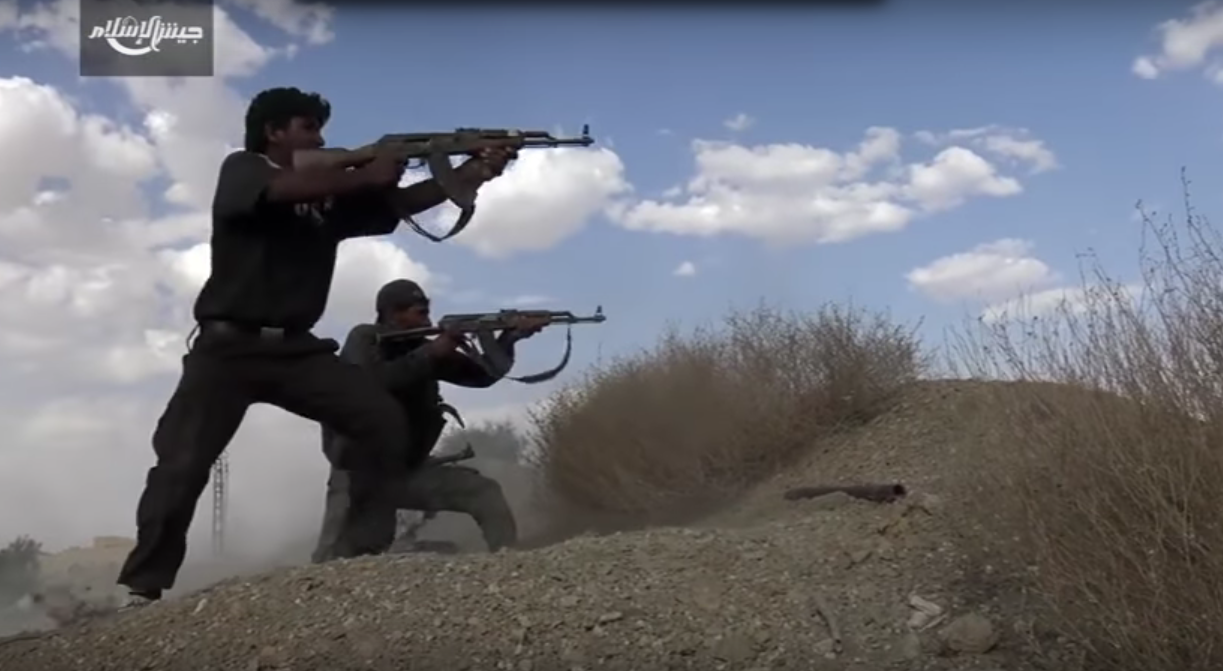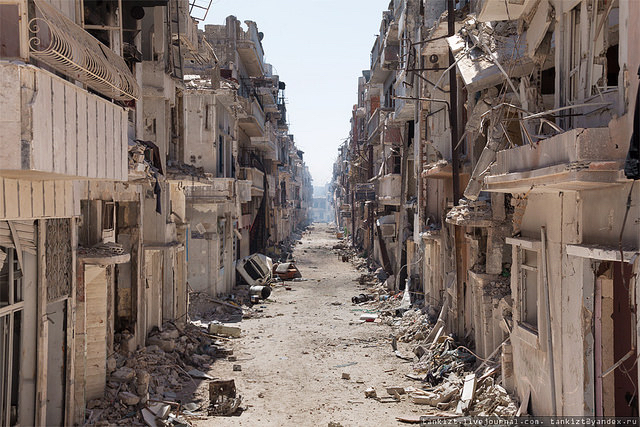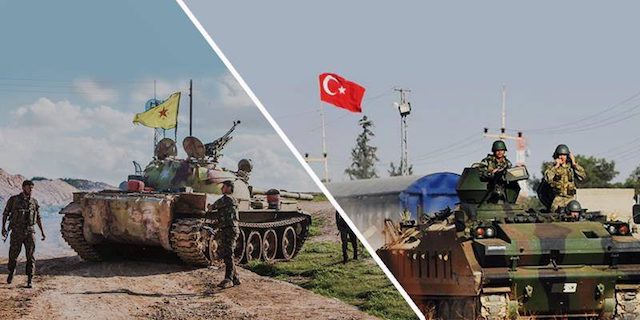After enduring four years of government-imposed siege and living under the increasingly authoritarian rule of the armed opposition, residents of the Damascus suburb have no choice but to join Jaish al-Islam if they want to find work.
DAMASCUS – Omar has a university degree in commerce and economics. But, like many of the people in his hometown of Douma, the 30-year-old has not been able to find meaningful work since the war began. And with the Damascus suburb under siege and the cost of living skyrocketing, he has struggled badly to support his family.
Staggeringly high unemployment and the daily struggle of families to survive and feed themselves has been a constant feature of the war across the country. In Douma, however, there is another twist to this hardship: if the men want to find a job, they must work for the militant Jaish al-Islam, which has taken total control of the local labor market.
Pro-government forces started besieging Douma in 2013, since when the government has been “relentlessly bombing anybody and anything they feel they can get away with,” according to Amnesty International. Located in Eastern Ghouta roughly six miles (10km) outside the capital, the city of nearly 140,000 people has been under the control of Jaish al-Islam – an armed opposition group known for its hard-line interpretation of Islam and authoritarian rule – since late 2013.
In the past four years of the siege, humanitarian aid has rarely made its way into Douma, making for a war economy based almost completely on the smuggling of basic goods. Combined with what The Century Foundation calls Jaish al-Islam’s “near-monopolistic control over food imports,” this has left residents struggling with rampant inflation. In March 2015, the pro-opposition Douma Coordination Group claimed that the price of a kilo of sugar in Eastern Ghouta was 2,750 Syrian pounds ($12.80) compared with 120 SYP ($0.55) in Damascus.
In addition to controlling the food supplies and all political, military and judicial institutions, Jaish al-Islam has a monopoly on employment in Douma. The group has set up an employment center where applicants are matched with available jobs, almost all of which they control. The armed group’s approval is required even for private initiatives, such as shops, charities and pharmacies.
Faced with the prospect of being unable to feed his family, Omar had no choice but to visit the center and accept the work Jaish al-Islam assigned him. Many men in Douma face the same fate.
Fighting for a Living
For Mohammad – whose name has been changed for security reasons – fighting with Jaish al-Islam was one of the more profitable employment options. The 29-year-old, who recently left the group’s ranks, earned nearly $100 a month fighting – more than he could scrape together in his previous job as a street vendor in the war-battered city.
Higher-ranking fighters get better pay, but opportunities to climb the ranks are largely dependent on personal relationships and familial ties with the group’s military officers or spiritual leaders, Mohammad said.
He decided to quit after becoming disenchanted with the group’s objectives. “When I joined Jaish al-Islam, I thought that I was going to liberate Syria from tyranny,” he said. “But later I later discovered that Jaish al-Islam is no different from the Syrian regime.”
Tunnel Digging
In Douma, tunnels are used to smuggle everything from medicine and food supplies to ammunition – and even people. The difficult and sometimes dangerous work of digging the tunnels connecting Douma with areas beyond the siege borders is another field of work available to the city’s many unemployed men and pays nearly $100 a month.
“We work for 12 hours a day,” said Omar, a 25-year-old resident of Douma. “If I do not finish the task on time, they dock my salary. Sometimes we do not get paid for several months. I don’t like this job, but I have no other choice. I do not have the connections to get a better job.”
The manual labor is so arduous that, occasionally, Jaish al-Islam will assign the work to its prisoners. Men are reported to have died as tunnels collapsed on them while they were digging, or through lack of ventilation. Some have been killed by government bombs targeting the tunnels, or arrested by pro-regime forces after being accused of attempting to smuggle goods through the underground routes.
Police Informants
One of the highest-paid jobs with Jaish al-Islam in Douma is not that of a fighter, but an informant for its Promotion of Virtue and the Prevention of Vices institution – a form of religious police. For roughly $200 a month, informants are required to report violations of its code to the armed group, who will then usually arrest the accused party to “send the message that they are present and powerful,” said 22-year-old Douma resident Bilal.
The informant can also earn a bonus for each reported violation, which can range from publicly opposing Jaish al-Islam and cursing to “blasphemy” and the wearing of “indecent clothing” by women, Bilal added.
Women, too, are sometimes employed as informants. As the number of men who have been killed or detained grows, women in Douma are increasingly becoming the primary breadwinners and are in need of work. However, jobs for women under Jaish al-Islam’s rule that pay well enough to survive are slim.
Um Shadi, 45, lost her husband in the August 2013 chemical attack on Eastern Ghouta. Every day at dawn, she leaves her house in the city’s suburbs and heads to Douma’s market downtown, where she works as a street vendor. “I sell pastries and dates, and bake everything at night so I can sell during the day,” she said. “I have three children, and I have to provide for them.”
Like Um Shadi, Omar made sacrifices to put food on his family’s table. At his first visit to the employment center, Jaish al-Islam officials said he was too small to be a fighter and offered him an administrative job for $75 a month. A few months into his new post, however, the group found itself short of fighters and Omar was transferred to the front line to fight. Shortly afterwards, Jaish al-Islam transferred him again, to his current job of car maintenance.
The working hours are long, sometimes up to 18 hours a day, and the pay is low, Omar said, but he has no alternative. “They treat us like prisoners, but there is nothing we can do.”
This article originally appeared on Syria Deeply, and you can find the original here. For important news about the war in Syria, you can sign up to the Syria Deeply email list. Photograph courtesy of ItismeSteven. Published under a Creative Commons license.





